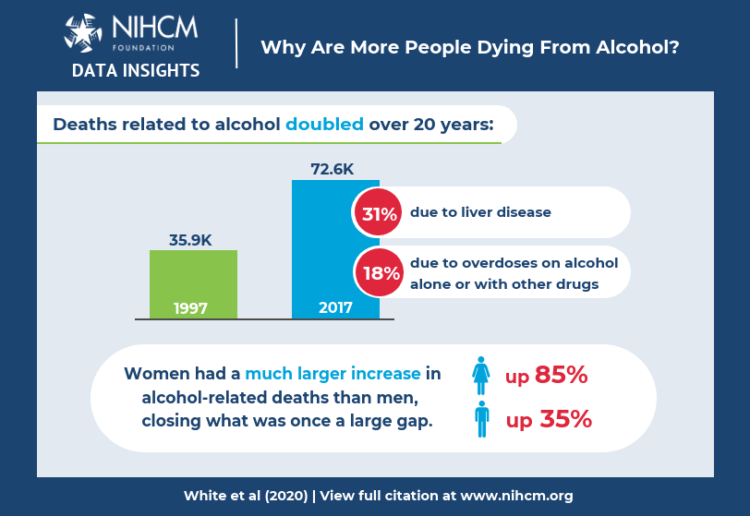NIHCM Newsletter / February 2020
More People Dying From Alcohol

Why Are More People Dying From Alcohol?
Deaths related to alcohol more than doubled between 1999 and 2017 – and that only counts alcohol-related deaths documented in death certificates, which means the actual numbers could be much higher. While adults aged 45-74 had the highest rates of death related to alcohol, young adults aged 25-34 showed the biggest increases over time. Women also saw an 85% jump in alcohol-related deaths over the study period, compared to a 35% increase for men - closing what was once a large gap in alcohol use and harms between men and women. While many of the deaths resulted from liver disease, researchers attribute the raise in deaths among middle-aged adults to “deaths of despair,” including overdoses and suicides.
Check out our Defying Despair webinar series for resources for people of all ages who are struggling with mental health or substance use and want to improve their overall health and well-being.
New Tools to Support a Healthy Lifestyle
More than 15% of adults in each state are physically inactive, meaning they self-reported that they had not participated in any physical activity outside of their regular job in the past month. New state-by-state maps from the Centers for Disease Control and Prevention show how physical inactivity varies geographically and by race/ethnicity. Across states, inactivity estimates ranged from a low of 17.3% in Colorado to a high of 47.7% in Puerto Rico. To help their members live healthy lifestyles, Independence Blue Cross is expanding its programs promoting fitness and nutrition. Through the GlobalFit Anywhere app, members can find the best prices for fitness classes and training sessions across multiple fitness providers. Additionally, through a partnership with MANNA, more Medicare Advantage members will have access to free, medically tailored meals delivered to their home, as well as free nutritional counseling.

Responding to the Opioid Crisis in the Workplace
In response to skyrocketing opioid overdose deaths, Together Arkansas was established to help employers cope with the opioid crisis, from where to refer their employees for treatment to establishing policies to keep the workplace drug-free. This opioid response initiative was developed through a partnership between the Arkansas State Chamber of Commerce, the nonprofit AFMC and Arkansas Blue Cross and Blue Shield.
Other organizations across the country have also recognized the need to address the opioid crisis at work. Blue Cross Blue Shield of Massachusetts launched an opioid toolkit pilot program last year, sending naloxone kits to selected employers. Additionally, the National Safety Council published a free Opioids at Work Employer Toolkit last fall.
The Barbershop Approach to Diabetes Prevention
Of the 30 million Americans living with diabetes, roughly one quarter of them don’t know they have the disease. While diabetes can lead to serious complications if not controlled, early intervention gives people the opportunity to make lifestyle changes that can prevent, delay or better manage type 2 diabetes. That’s why researchers are exploring community-based approaches that screen people for diabetes closer to home. A new study evaluated a program conducting diabetes screening in barbershops, finding that one-third of the men approached were willing to do the screening. They also noted that the barbers were important health advocates as they encouraged some customers to get screened after they initially declined.
To help people make the lifestyle changes needed to prevent diabetes, Blue Cross Blue Shield of Michigan has awarded a $50,000 grant to the National Kidney Foundation of Michigan (NKFM). The NKFM will use this funding to enroll Medicaid-eligible participants from high-risk communities in their CDC-certified Diabetes Prevention Program.
Funding Opportunity-Behavioral Health
The Substance Abuse and Mental Health Services Administration (SAMHSA) is accepting applications for grants to expand Certified Community Behavioral Health Clinics to increase access to and improve the quality of community mental health and substance use disorder treatment services.
Private foundations are also working to fill gaps in behavioral health care access. The Blue Cross Blue Shield of Massachusetts Foundation has awarded a $200,000 grant to the sole provider of emergency behavioral health services on Cape Cod. The funding will support follow-up services, outreach, and efforts to accelerate access to treatment for people with substance use disorder.
More Related Articles
See More on: Social Determinants of Health | Substance Use
